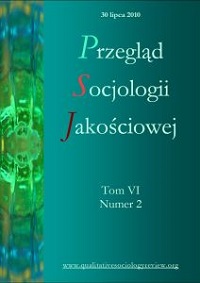Przemodelowywanie teorii ugruntowanej
DOI:
https://doi.org/10.18778/1733-8069.6.2.04Słowa kluczowe:
teoria ugruntowana, analiza danych jakościowych, metoda ciągłego porównywania, wrażliwość teoretycznaAbstrakt
Artykuł ten przedstawia w zarysie moje zaniepokojenie licznymi przemodelowaniami teorii ugruntowanej (GT – Grounded Theory) przez analizę danych jakościowych (QDA – Qualitative Data Analysis) i ich podważającym GT oddziaływaniem. Przytaczam kilka przykładów takiego podważania oraz opisuję najważniejsze elementy klasycznej metodologii GT. Mam nadzieję, że artykuł wyjaśni moje obawy dotyczące nieprzerwanie entuzjastycznego, lecz niepoprawnego, przyjmowania GT przez metodologów QDA i posłuży za wstępny przewodnik młodym badaczom, pragnącym poznać podstawowe zasady GT.
Pobrania
Bibliografia
Baker, Cynthia; Judith Wuest i Phyllis Stern (1992) "Method Slurring, The Phenomenology /Grounded Theory Example." Journal of Advanced Nursing 17: 1355-1360.
Google Scholar
DOI: https://doi.org/10.1111/j.1365-2648.1992.tb01859.x
Creswell, John W. (1998) Qualitative Inquiry and Research Design. Thousand Oaks: Sage.
Google Scholar
Glaser, Barney G. (1978) Theoretical Sensitivity: Advances in the Methodology of Grounded Theory. Mill Valley: Sociology Press.
Google Scholar
Glaser, Barney G. (1992) Basics of Grounded Theory Analysis. Mill Valley: Sociology Press.
Google Scholar
Glaser, Barney G. redaktor (1993) Examples of Grounded Theory. A Reader. Mill Valley: Sociology Press.
Google Scholar
Glaser, Barney G. redaktor (1994) More Grounded Theory Methodology. A Reader. Mill Valley: Sociology Press.
Google Scholar
Glaser, Barney G. redaktor (1995) Grounded Theory 1984 to 1994. Mill Valley: Sociology Press.
Google Scholar
Glaser, Barney G. (1998a) Doing Grounded Theory. Issues and Discussions. Mill Valley: Sociology Press.
Google Scholar
Glaser, Barney G. (2001) The Grounded Theory Perspective: Conceptualization Contrasted with Description. Mill Valley: Sociology Press.
Google Scholar
Glaser, Barney G. i W. Douglas Kaplan, redaktorzy (1998b) Gerund Grounded Theory: The Basic Social Process Dissertation. Mill Valley: Sociology Press.
Google Scholar
Glaser, Barney G. i Anselm L. Strauss (1965) Awareness of Dying. Chicago: Aldine Publishing Co.
Google Scholar
Glaser, Barney G. i Anselm L. Strauss (1967) Discovery of Grounded Theory: Strategies for Qualitative Research. Mill Valley: Sociology Press [polskie wydanie (2009) Odkrywanie teorii ugruntowanej: Strategie badania jakościowego. Kraków: ZW Nomos].
Google Scholar
Gummesson, Evert (2002) "Relationship Marketing and the New Economy: It's Time for De-Programming." Journal of Services Marketing 16(7): 585-589.
Google Scholar
DOI: https://doi.org/10.1108/08876040210447315
Lowe, Andy (1997) Managing to Post Merger Aftermath-Default Remodeling. Department of Marketing University of Strathclyde (Grounded Theory Review).
Google Scholar
May, Kathryn (1994) "The Case For Magic in Method." S. 10-22 w Critical Issues In Qualitative Research Methods, pod redakcją Janice Morse. Thousand Oaks: Sage.
Google Scholar
Morse, Janice (1994) "Emerging from the Data. Cognitive Processes of Analysis in Qualitative Research." S. 23-41 w Critical Issues in Qualitative Research Methods, pod redakcją Janice Morse. Thousand Oaks: Sage.
Google Scholar
Morse, Janice (1995) "Editorial." Qualitative Health Review 5: 147-149.
Google Scholar
DOI: https://doi.org/10.1177/104973239500500201
Pobrania
Opublikowane
Jak cytować
Numer
Dział
Licencja

Utwór dostępny jest na licencji Creative Commons Uznanie autorstwa – Użycie niekomercyjne – Bez utworów zależnych 4.0 Międzynarodowe.














